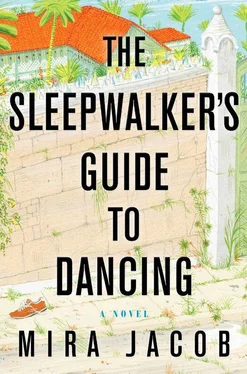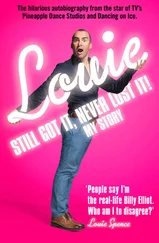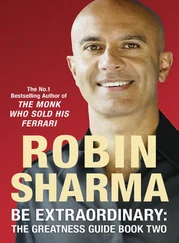“Oh, man, should we worry about that?” Amina asked.
“He’s eaten worse.”
The okra were the next to go, slimy fingers shot one by one across the yard, two of the dozen actually hitting the target, though not within the raccoon outline. The beets fared worse, which disappointed both of them if only for the promise of a bloody-looking hit. Prince Philip dutifully hunted them down, returning with horrible pink teeth.
“You do a biggie,” Thomas said.
Amina lifted an eggplant from its Tupperware, shuddering at its cold, soft weight in her hand.
“Okay, so you’re going to try to get the sling back as far as possible, but don’t worry about that so much. Put it more in the center, okay? Right. That’s pretty good.”
Amina pulled back another three inches, grunting.
“Strong girl,” Thomas said approvingly. “Good. So once you feel secure, try to angle it toward the—”
“Shit!”
The sling sprang from her grip, hurtling forward with a horrible whipping noise. They both ducked and, when nothing happened, straightened up, looking hopefully at the target. It was clear. Amina looked at Prince Philip, who looked anxiously back at her. The eggplant had disappeared.
“Jesus, kid!”
“Goddamn it. Give me the other one.”
“Are you kidding?” Thomas laughed. “You’re dangerous!”
“Give it!”
“Yeah, yeah, fine.” Thomas bent to retrieve the other half of the eggplant, just as a high, thin, keening cry pierced the afternoon. It left a wake of silence behind it, and Amina looked fearfully at the sky.
“What the hell was that?” she asked.
“No idea.”
And then they heard it again, a cry so wild and raw that they stood up on the truck bed. Prince Philip shot out an alarmed bark, and they turned to each other, eyes widening in recognition. The third cry sent them jumping into the open field and running through the tall grass, Amina’s legs chasing her father’s toward the garden.
And what was there to say about Kamala’s figure huddled in the dirt, her fingers covered in mud, her face streaked with it, the howls that exploded from her throat? Amina and Thomas ran toward her, hurdling compost bins and piles of mulch. Kamala had fallen down. She was on the ground. Prince Philip barked angrily at the closed garden gate.
“Ma!”
The ground had been ripped apart, black clumps of soil strewn everywhere. A garden shovel lay where it had been dropped. Next to it, Kamala clutched herself, rocking, rocking. Amina bent down, touching her mother’s shoulder.
“Ma? Are you okay?”
Kamala jerked upright, the cuff of a jacket spilling out of her arms.
“Oh my God,” Amina said. “Mom what are you doing with—”
“You!” Kamala shrieked. “You get away! Get away, you filthy devil!”
But she was not talking to Amina. She was looking with burning eyes at the garden gate, where Thomas stood.
“Dad? Dad didn’t …” Amina turned to look at her father, who was staring at Akhil’s leather jacket with the sad, stunned recognition of a dreaming man returning to the waking world.
“Dad?”
Thomas shut his eyes.
“Dad, what did you do?”
“I’m so sorry,” her father said.
BOOK 7 AKHIL THE GREAT, THE LATE
ALBUQUERQUE, 1983
Paige and Akhil could not get enough of each other.
Yes, it was a cliché, one that Amina had often heard describing the kind of love that required couples to sit on each other’s laps when the whole couch was available, but with Akhil and Paige, it was literal. From the start, it seemed to her like they’d plunged into an underwater world in which the only way to breathe was through each other.
It was a shock, of course, seeing Akhil — only recently minted into fuckability by Mindy — approach Paige in the quad the following Monday with a notebook that he’d emblazoned with her name in black Sharpie. No one expected Paige to blush any more than they expected Akhil to reach out and tuck her hair behind her ear before walking quickly away. But then notes were exchanged in lockers. A hide-a-key box was left wrapped on the hood of the station wagon to prevent future lock-outs. Less than one week later, when they were kicked out of the library for talking too loudly about the drought in Ethiopia, it seemed strange that it had taken them two months to get together.
She was perfect for him. Yes, another cliché, but there were times when Amina felt that somehow Paige Anderson had been pulled out of a very specific dream that no one but Akhil would have bothered to have. It wasn’t just that her upbringing on one of the finest university campuses in America had left her with a carefully curated collection of protest T-shirts (it had), or that she referred to her parents as “Bill and Catherine” (she did), or that she was leading a student coalition to campaign against the nuclear-waste site just outside Socorro (she was), or that her thighs and breasts and blurry mouth were primed for constant, prolonged attention (they were) — it was that every part of Paige, from her conscience to her politics to her grown woman’s body, was suffused by an optimism so assured that to stay with her, Akhil had to stop being such an angry dick.
“So what?” Amina overheard Paige saying to Akhil one morning during one of his poor-Indian-me rants as they walked across campus. “We’re a country of immigrants, and you’re the first wave. At least you’ve got an opportunity to set your own stereotype.”
Paige believed that changing the world for the better was a reasonable goal, that racism could be unhinged by education, that nuclear disarmament should be embraced in their lifetimes, and that equality between the sexes would surely occur as women integrated into careers dominated by math and science. She also believed every act of consensual sex released positive energy into the atmosphere.
Most important, Paige believed in Akhil. Or at least gave him the benefit of most doubts. In her eyes, Akhil’s political tirades became evidence of great passion. His neuroticism belied a big heart. His tendency to pick fights was a desire for honest communication. His pot habit was introspective.
And strangely enough, with Paige’s eyes on him, Akhil began to transform. Amina watched with marvel as her brother’s rants became less didactic, his worries developed rich humanitarian undertones, and his endless baiting turned into invitations for “discourse.”
“Do they ever stop talking?” Dimple asked some weeks later, as their dark heads crossed the campus, ducked to the world outside of each other.
“Not really,” Amina said. But she had listened in on enough of their phone conversations to know that it wasn’t so much what they talked about (Van Halen, apartheid, Riemann sums) as the charged pauses in between, the reevaluating and rethinking, that was truly remarkable. In fact, it wasn’t until Akhil stopped driving Amina home altogether, and started returning from “after school activities” with lips rubbed to pulp, that Amina began to worry that the union might be too intense.
“We’re just driving to the top of the mountains and back down,” he told her when she hinted as much. “We do some of our best thinking at higher altitudes.”
And where was Jamie during all of this? Right there, and yet, somehow, not. He still showed up for English class, and he still seemed interested when she was talking, but beyond catching eyes once or twice, neither of them knew what to say to the other. It wasn’t a lack of interest so much as an eclipsing of one — a mutual embarrassment that their own odd exchange could be overshadowed by something as potent as their siblings’ connection.
Читать дальше












